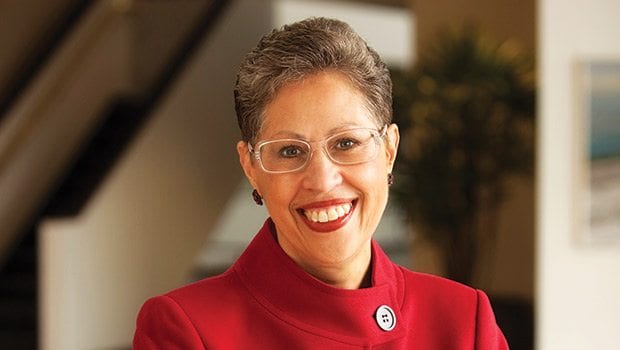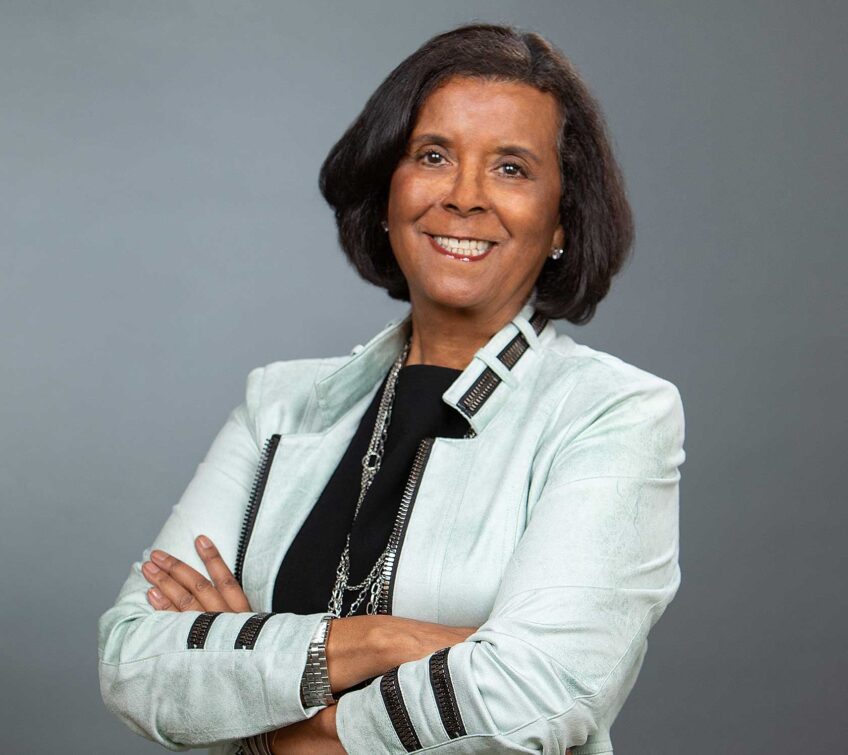

The Partnership President and CEO Carol Fulp.
The numbers show the life sciences industry is one of the fastest growing industries in the world, and Massachusetts is leading the way as a renowned hub for the sector. However, industry insiders are concerned about the lack of diversity in life sciences and are spending money to address the issue.
The Massachusetts Life Sciences Center — a Waltham-based organization that supports life sciences innovation, research and development — is giving $100,000 to The Partnership to examine the state of diversity in the life sciences industry and create a professional development program that will help train and retain underrepresented minorities in the industry.
In addition, the money will back a workshop bringing together some of the state’s top life sciences companies to generate the best practices for increasing diversity in the sector and making it more inclusive.
Gov. Deval Patrick was on hand to announce the grant at the Partnership’s annual meeting Dec. 9 at the Seaport World Trade Center.
“By providing workers from diverse backgrounds with important skills and training through this grant, we are supporting opportunities in this critical industry and ensuring a strong economic future for our Commonwealth,” Gov. Patrick said in a statement.
As part of a sector that is expected to drive both the U.S. and the global economy forward, companies in the life sciences industry view diversity not as a feel-good effort, but as a strategic necessity.
Mass Life Sciences Center President and CEO Susan Windham-Bannister points out that Latinos, Asians and African-Americans make up the fastest-growing segment of the work force and can provide a variety of skills that life sciences companies need.
“This is fastest-growing sector of the economy and they are the fastest-growing members of the economy,” Windham-Bannister said. “It stands to reason that these companies are going to have to look to a diverse workforce to find the employees they need.”
Having pumped tens of millions of dollars into STEM education and workforce development programs, many focused on communities of color, as well as having implementing a 10-year, $1 billion, state-funded investment initiative into life science jobs and support, the Mass Life Sciences Center was quick to engage The Partnership to get become involved in diversifying the life sciences sector.
The grant will support The Partnership’s first-ever efforts to target a specific industry.
Headquartered in Boston, The Partnership has been working for almost three decades to help professionals of color find high-level jobs and also has helped companies attract and retain professionals of color. About 3,500 individuals have taken part in The Partnership’s leadership development programs and the organization also works with about 250 companies in industries such as health care, finance, banking, media, retail and legal.
Carol Fulp, president and CEO of The Partnership, says the life sciences industry’s current and expected growth rate warrant specific attention.
“The future of any industry will be critically tied in to diversity in its workforce,” Fulp says, and she wants her organization to help the leading sectors achieve the diversity they need to be successful.
She has been very impressed, she said, with initial forays into life sciences and the desire of industry leaders to assure communities of color are better represented.
“Life sciences is global and innovative in nature, and diverse,” Fulp said. “Diversity is very valuable in this industry because you need diversity to create innovative products.”
As part of The Partnership’s efforts to better understand the diversity needs of the life sciences industry, the organization has added Javier Barrientos, senior director of global diversity and inclusion at Cambridge-based biotechnology company Biogen Idec, to its board.
Biogen will help host the planned workshop with life science industry companies and executives.
The Partnership will also use some of the funding to tailor its leadership development program for professional of color in life sciences jobs.
According to Windham-Bannister, the money from the MLSC will help The Partnership get its feet in the door of the life sciences industry, but will not be an ongoing source of funding. Nevertheless, she expects life sciences companies to step up and provide ongoing funding once the organization shows what it can do to bolster diversity.
The collaboration with the MLSC has Fulp very excited about The Partnership’s foray into life sciences.
“It seemed like just a really great natural fit,” she said. “We just see a very promising future.”






